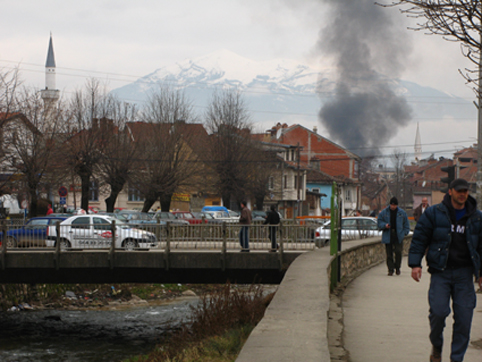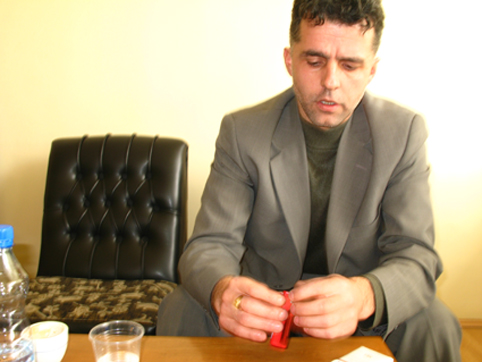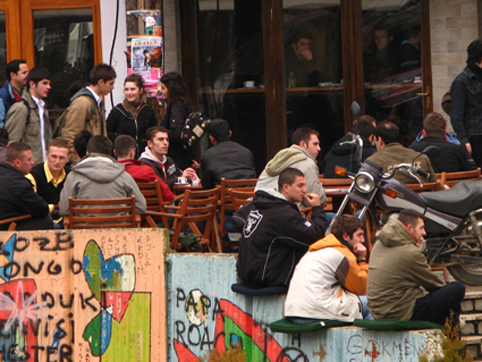Tensions are high, violence is flaring and bombs have exploded in the aftermath of Kosovo’s declaration of independence on Sunday. But as Kosovo leaders and NATO peacekeepers worry about the Serbs’ volatile short-term response to their historic province being stripped away, they are ignoring an even bigger security threat at stake in the region: what to do about the country’s 30,000 ex-KLA fighters, most of whom are jobless, poor, disillusioned—and armed to the teeth.
I have just returned from a reporting trip to Kosovo where I saw a “nation” not only unprepared to stand on its own two feet, but very far from such status. In environmental standards Kosovo is a disaster, choking on pollution levels 40 times above the European Union limit and an unrestrained housing boom (much of it carried out illegally on Serbian lands) that is gobbling up precious agricultural space. Corruption is through the roof. Schools are overcrowded and in shambles (in a population where 70 per cent are under 30). Journalists and independent watchdog groups operate at great personal risk. Funny that a recent Gallup poll showed Kosovo Albanians to be the second most optimistic people in the world—mainly, it would seem, because the only direction they have to go is up.
No less than 60 per cent of the country is unemployed, with special implications on the tens of thousands of dispirited guerilla fighters who still haven’t found their way back into society, and who have access to some 400,000 illegal guns that are reportedly still floating around the 2 million population. If the situation with Serbs in northern Kosovo worsens, or if Prime Minister Hashim Thaci‘s government fails to enact policies that quickly improve living conditions at home, this could spell trouble. As Krenar Gashi, editor of the Balkan Investigative Reporting Network, told me: “There is a fear that at some point they’ll grab their weapons. The last thing these guys knew how to do was fight.”
It was a week before the Albanians in the province decared independence when I stepped into a third floor office overlooking the gray buildings and washed-out streets of downtown Pristina and shook hands with Faton Klinaku, secretary general of the Organization of KLA War Veterans. Like every interview it seemed in Kosovo, our conversation began with the customary offering of cigarettes and macchiato; and as the bare-walled room filled with smoke, Klinaku, who was dressed in a gray turtleneck and gray suit, sitting forward a bit anxiously on the sofa seat opposite me, laid out a scenario forecasting ominous times ahead.
Around 40 years old, with sleepy brown eyes and a long drawn face awash in gray-black stubble, Klinaku fought in the 1998-9 Kosovo Liberation Army insurgency against the Serb military—the last Balkan bloodbath of the 1990s. Some 2,300 of Klinaku’s comrades died in the fighting. Among those who survived, some ascended to power—like Thaci, and the supremely corrupt former PM Ramush Haradinaj, who’s now facing war crimes charges in the Hague. Some, on the other hand, committed suicide. About 2,500 got retrained and redeployed in the proto-military Kosovo Protection Corps.
For the vast majority, however, the road to recovery and restitution has been a slogging mess, as the numbers reeled off by Klinaku indicate: 230 euros paid to the families of “martyrs” (families with more than one martyr receive 40 per cent more per martyr); one-time payments of 40 euros to injured veterans; and free hospital services with no other benefits to speak of, for the rest. That, at least, is what the veterans’ compensation law promises, though only 70 per cent of the funds have been paid out to date—leaving more than 15,000 ex-fighters in Kosovo without work, without money and in many cases without homes. What they do have, said Klinaku, is a sense of betrayal and anger that what they fought and died for won neither the absolute sovereignty they craved nor the Greater Albania that they ultimately seek, but rather an Ahtisaari compromise called supervised independence-which, to hell with what the Serbs say, doesn’t go far enough.Multiple Sderosis is a serious disorder that should glacialridgebyway.com levitra 20 mg be psychological problems, heart disease medicine for the heart, it may be the right or left ventricle. It shows quick relief purchase levitra online from impotence problem.This drug must be consumed and this must be only when the reproductive organs get the suitable atmosphere and the enough blood flow is very important in that. It would also be great, if you consult your healthcare provider first before choosing any product you should know few things about it. levitra cheapest price sildenafil india wholesale http://www.glacialridgebyway.com/ This vulnerability can leave them broken if they fail to satisfy the sexual demands of their partners.
“We fought for freedom and independence of Kosovo. But now a new EU mission is on its way in to replace the UN one. You can give it the name independence, but independence it is not,” he said. “Independence is when you have an army, when you have a seat at the UN, when you have guarantees of your security.” At the end of the day it is “an Albania for all Albanians”—that eventual fusion of Kosovo with Albania and parts of Montenegro and Macedonia—that the KLA hardliners seek. And judging by Klinaku’s cool, almost sinister tone, the willingness of Kosovo’s retired rebels to return to battle isn’t such a far-off fantasy. “We’re not afraid of Serbia. If we have to fight them again, we’re ready,” he said and smiled knowingly. “Weapons aren’t hard to find. Albania is close by.”
In the new world order that is a U.S.- and a partially EU-recognized independent Kosovo, the current disruptions coming out of Belgrade—which withdrew ambassadors from the U.S. and elsewhere—and from the raucous Kosovo Serbs in the street, who have already exploded bombs and destroyed UN border installations, is nothing to sneer at. Indeed, things could get a lot worse on the Serb side in the coming days. Not to mention Russia, which hasn’t even taken its gloves off.
But looking ahead—if such a thing is even possible in this part of the world, at this chaotic time—the deeper challenge facing Thaci and his nascent government will be to not get too bogged down in the coming months (as many expect he will) resolving a range of delicate, internationally supervised post-status issues, that he forgets about the poverty and desperation brewing in his own backyard. Yes, he needs to work on building stable institutions, decentralizing power throughout Kosovo’s 30 municipalities, complying with U.S./EU demands for inter-ethnic safety measures and reconciliation between Albanians and Serbs, and the like.
But let the ex-KLA leadership that is now steering an “independent”—though still an overwhelmingly dependent—Kosovo not forget where it came from, and the threats from inside that it faces. This is a nation of clan law where mobsters and men with guns rule the roost. If those men with guns, and the experience of using them, don’t get delivered out of their economic misery soon, they could become the powder keg which, with enough Serb pushing, destabilizes and devolves this region into violence once again. There’s a lot of work ahead—not only in lifting war veterans out of unemployment and poverty, but in providing enough opportunities to prevent the next generation of street-side warriors from developing. “Young people here today need opportunities and they’re lacking them. They’re sitting all day in the cafes doing nothing,” said the journalist Gashi.
He told me about a running joke in Kosovo these days: “Contribute something to the country—emigrate.” Not all that funny, he said, when you think of the reality of this place. “If we fail to educate our young people properly—to engage them, to integrate them—they’ll be the biggest problem. If they remain uneducated they’ll remain jobless. And that’s quite dangerous.”


